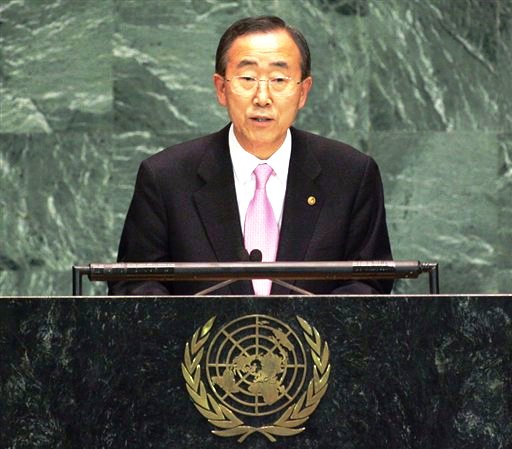LEAD: Billionaires, politicians join forces against global woes
 New York - Major charity foundations, government leaders and politicians of all stripes joined forces on Thursday to push for progress in ending poverty and hunger and fighting diseases that continue to kill thousands of people each year.
New York - Major charity foundations, government leaders and politicians of all stripes joined forces on Thursday to push for progress in ending poverty and hunger and fighting diseases that continue to kill thousands of people each year.
UN Secretary General Ban Ki-moon launched the one-day session on reviewing progress achieved so far on implementing the Millennium Development Goals (MDGs). He warned that a financial crisis sweeping across advanced economies would actually have its greatest effect on the poor.
Ban said the financial turmoil besieging many countries, including the largest donors like the United States, was only adding to food and energy crises already affecting developing countries.
"The current financial crisis threatens the well-being of billions of people, none more so than the poorest of the poor," Ban told the UN General Assembly. "This only compounds the damage being caused by much higher prices for food and fuel."
"We must rise to all of these challenges immediately," he exhorted the nearly 100 world leaders attending meetings at UN headquarters in New York to achieve the MDGs by its target date of 2015.
Ban called on governments to be "bold" and "generous" in their commitments during the meeting.
Bill Gates and his wife, who run the Bill and Melinda Gates Foundation, and Howard G Buffett, whose foundation provided hundreds of millions of dollars to global programmes fighting poverty and diseases were present at UN meetings to answer calls for generosity.
The billionaires pledged this week initial funding of 76 million dollars to the World Food Programme that will provide seeds and assistance to farmers over the next five years. The scheme hopes to help a total of 350,000 farmers in 21 developing countries by the end of that period and feed hundreds of thousands of people.
British Prime Minister Gordon Brown told the MDGs session presided over by Ban that the hungry are dying while the UN debated on programmes.
"Facing betrayal of the MDGs, we say again we will come, but many continue to die while we wait," Brown said. "And I believe our greatest enemy is not war or inequality or any single ideology or a financial crisis; it is too much indifference."
"Our global leadership itself is being questioned and let us face the shameful truth that while we have made huge advances - 40 million more children at school, 3 million children living who would otherwise have died, 3 million getting treatment for AIDS -the 2015 goal to cut maternal in infant mortality will not be met even in 2020 or 2030, not before 2050," he said.
There are still 75 million of the world's children not attending school, and the goal of providing education to every child will not be met on present trends in 2015 or 2025 or even in 2100, Brown said.
"I say to the richest countries of the world the poorest of the world have been patient, but a hundred years is too long to wait for justice," he said.
Brown said he expected around 8 billion dollars in new development initiatives to be put forward during the day.
The goal of reducing maternal mortality has so far eluded the UN despite global efforts involving various governments and organizations. At the UN, Norwegian Prime Minister Jens Stoltenberg launched Thursday a progress report on the global campaign for health.
The report called for urgent and effective international action to accelerate progress towards the UN goals of reducing maternal and child deaths by 2015.
It said in order to save 3 million mothers and 7 million newborns from death each would require an additional 2.4 billion dollars in 2009, and rising to 7 billion dollars in 2015.
The report called for mobilising international support for stronger health systems, including the training and recruitment of over 1 million health workers.
Stoltenberg and Brown announced a new taskforce that would look at new methods of financing for health programmes.
Bill Gates called health the "gateway to progress," something that wealthy nations have all too often taken for granted. (dpa)